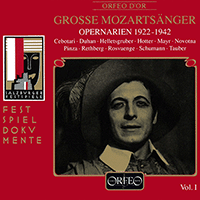Elisabeth Rethberg
Elisabeth Rethberg (original name Lisbeth Sättler) showed considerable musical talent from an early age; her parents were both amateur musicians and she is reputed to have been singing songs by Schubert when only seven years old. She entered the Dresden Conservatory in 1912, initially to study piano with the intention of becoming a concert pianist; but her voice teacher, Otto Watrin, persuaded her to concentrate on singing instead.
She made her operatic stage debut in 1915 at the Dresden Court Opera as Arsena / Der Zigeunerbaron and remained with the Dresden company for seven years until 1922. During this time Rethberg undertook a very wide range of roles, indicating not only her extraordinary musicality and ability to learn parts quickly, but also uncertainty on the part of the company management as to which vocal category (fach) she really belonged: by the time she left Dresden her repertoire extended to more than one hundred parts. Her first great success was as Agathe / Der Freischütz, while other notable repertory roles included Susanna / Le nozze di Figaro and the title role in Tosca, indicating her unusually wide range. In Dresden Rethberg participated in several significant premieres, including the first performances of Pfitzner’s two-act revision of Christelflein (1917) and Kaun’s Der Fremde (1920); and sang the Empress in the first Dresden performance of Richard Strauss’s Die Frau ohne Schatten in 1919. She also appeared as a guest with the opera companies of Berlin and Vienna and at the nearby Leipzig Gewandhaus concert hall.
During 1922 Rethberg travelled to New York with Watrin and immediately auditioned at the Metropolitan Opera, singing ‘Ritorna vincitor’ from Aida while still in her travelling clothes. She made her Met debut in November 1922 as Aida, winning excellent reviews, the New York Times noting: ‘…her high, clear, liquid tones of a singular brightness floating above Verdi’s orchestration with unforced ease’ in the first act. Rethberg went on to become a key member of the Met’s soprano roster for the next twenty years, where her versatility and the exceptional quality of her voice proved to be very valuable. Notable parts included, in addition to Aida and Agathe, Leonora / Il trovatore, Maddalena / Andrea Chénier, Santuzza / Cavalleria rusticana, Donna Elvira / Don Giovanni, Sieglinde / Die Walküre, Elisabeth / Tannhäuser, Eva / Die Meistersinger von Nürnberg, Pamina / Die Zauberflöte, Elsa / Lohengrin, Rachel / La Juive and the title part in Madama Butterfly. In 1928 she took the leading role of Rautendelein in the American premiere of Respighi’s La campana sommersa and sang the title role in a new 1931 production of Mascagni’s Iris. Later roles at the Met included Mimì / La Bohème, Amelia / Simon Boccanegra, Desdemona / Otello, Leonora / La forza del destino, Mařenka / The Bartered Bride, Donna Anna / Don Giovanni and the Countess / Le nozze di Figaro.
Toscanini was an especial admirer of Rethberg’s singing, comparing her voice to a finely played Stradivarius, and in 1928 the Guild of Singing Teachers of America voted her voice the most perfect in the world. However as the 1930s wore on, so did her voice, and an ill-advised attempt at the Siegfried Brünnhilde in 1942 was swiftly followed by her final performance at the Met (as Aida). Rethberg was very active outside New York: between 1928 and 1940 she appeared frequently at the San Francisco Opera, and between 1934 and 1940 in Chicago.
At the Royal Opera House, London Rethberg first appeared in 1925, returning between 1934 and 1939 with her Marschallin / Der Rosenkavalier being especially admired in 1936. Her debut at La Scala, Milan came in 1929 as Aida with Toscanini conducting and she sang at the Rome Opera in 1934. She returned regularly to Dresden, where special ‘Rethberg weeks’ were organized, and where in 1928 she sang the title part in the first performance of Richard Strauss’s Die aegyptische Helena. Her debut at the Salzburg Festival was in 1922 as Konstanze / Die Entführung aus dem Serail; she returned to sing Leonore / Fidelio (1933), Donna Anna (1937) and the Marschallin (1939).
Rethberg’s final appearance was in 1944, in concert at New York Town Hall, after which she retired, in 1956 marrying the Met comprimario baritone George Cehanovsky (her first marriage having been in 1923, to Ernst Albert Dormann).
The possessor of a most beautiful lirico spinto soprano voice, evenly produced across all the registers and with an exemplary command of legato, Rethberg perfectly combined beauty of tone with purity of style. She regularly made commercial recordings between 1921 and 1934, and several of her live Metropolitan Opera performances have been preserved, bearing witness to her great art.
© Naxos Rights International Ltd. — David Patmore (A–Z of Singers, Naxos 8.558097-100).

















